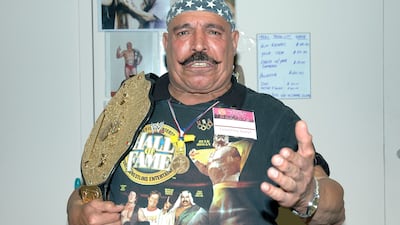The Iron Sheik, Iran's only WWE champion and one of Hulk Hogan's greatest rivals, has died at age 81, his team announced on Wednesday.
“It is with great sadness that we share the news of the passing of The Iron Sheik, but we also take solace in knowing that he departed this world peacefully, leaving behind a legacy that will endure for generations to come,” his team wrote in a statement posted on Twitter.
“His journey from a small village in Iran to becoming one of the most recognisable figures in the world of wrestling is a testament to his unwavering determination.”
Born in Damghan, Iran, Hossein Khosrow Ali Vaziri moved to the US in the 1960s and became an assistant coach for two US Olympic teams in the 1970s.
He joined the WWE in 1980 and embraced his character as “one of the most notorious villains” in the industry.
His charisma brought entertainment to the wrestling world at a time when the Iranian hostage crisis escalated tension between Washington and Tehran.
Vaziri won one WWE world heavyweight championship in 1983 and was part of a championship team with his partner, Nikola Volkoff. They were inducted into the WWE Hall of Fame in 2005.
Hulk Hogan would go on to defeat The Iron Sheik to win the world championship belt at Madison Square Garden in 1984.
His arguably most memorable match was against Sgt Slaughter, which played into nationalistic ideologies. The American wrestler defeated The Iron Sheik in the classic Boot Camp Match at Madison Square Garden.
Vaziri's character was rebranded during the height of the first Gulf War and he teamed up with Slaughter and General Adnan. The trio lost to Hulk Hogan and the Ultimate Warrior in the 1991 SummerSlam.

Outside of his wrestling moves, the Iron Sheikh was known for his catchphrases. Dwayne Johnson credited the wrestler for creating the word “jabroni”, a word used to describe a foolish person.
“His memorable catchphrases and unforgettable moments are etched into the memories of fans worldwide. He left an indelible mark on the industry, and his influence can still be felt in the world of wrestling today,” Vaziri's team wrote.
He is survived by his wife, two daughters and five grandchildren.

